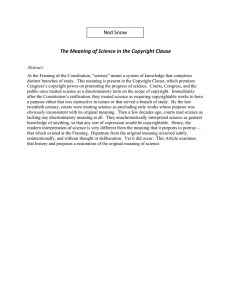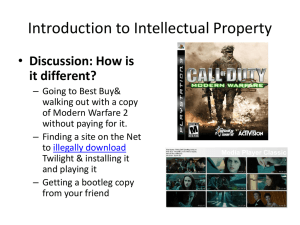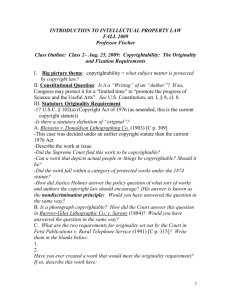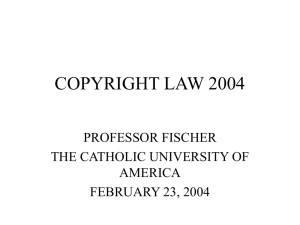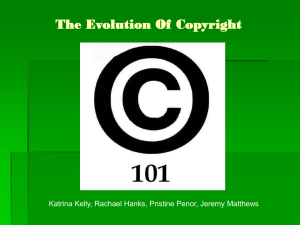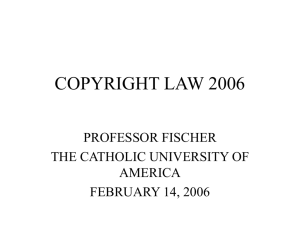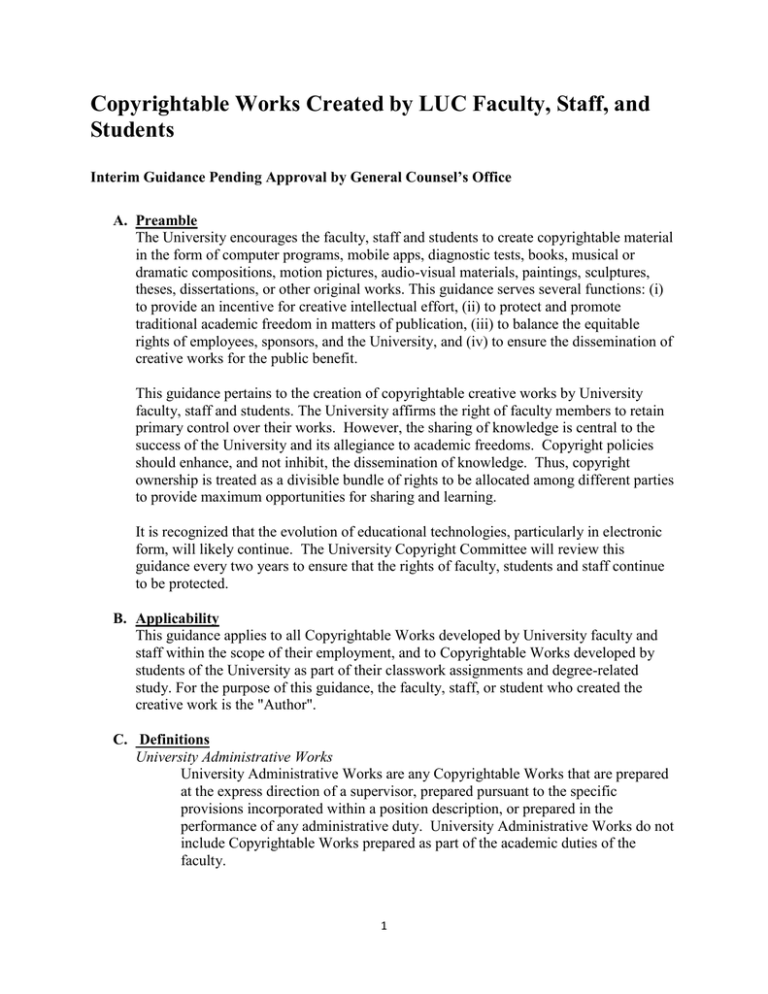
Copyrightable Works Created by LUC Faculty, Staff, and
Students
Interim Guidance Pending Approval by General Counsel’s Office
A. Preamble
The University encourages the faculty, staff and students to create copyrightable material
in the form of computer programs, mobile apps, diagnostic tests, books, musical or
dramatic compositions, motion pictures, audio-visual materials, paintings, sculptures,
theses, dissertations, or other original works. This guidance serves several functions: (i)
to provide an incentive for creative intellectual effort, (ii) to protect and promote
traditional academic freedom in matters of publication, (iii) to balance the equitable
rights of employees, sponsors, and the University, and (iv) to ensure the dissemination of
creative works for the public benefit.
This guidance pertains to the creation of copyrightable creative works by University
faculty, staff and students. The University affirms the right of faculty members to retain
primary control over their works. However, the sharing of knowledge is central to the
success of the University and its allegiance to academic freedoms. Copyright policies
should enhance, and not inhibit, the dissemination of knowledge. Thus, copyright
ownership is treated as a divisible bundle of rights to be allocated among different parties
to provide maximum opportunities for sharing and learning.
It is recognized that the evolution of educational technologies, particularly in electronic
form, will likely continue. The University Copyright Committee will review this
guidance every two years to ensure that the rights of faculty, students and staff continue
to be protected.
B. Applicability
This guidance applies to all Copyrightable Works developed by University faculty and
staff within the scope of their employment, and to Copyrightable Works developed by
students of the University as part of their classwork assignments and degree-related
study. For the purpose of this guidance, the faculty, staff, or student who created the
creative work is the "Author".
C. Definitions
University Administrative Works
University Administrative Works are any Copyrightable Works that are prepared
at the express direction of a supervisor, prepared pursuant to the specific
provisions incorporated within a position description, or prepared in the
performance of any administrative duty. University Administrative Works do not
include Copyrightable Works prepared as part of the academic duties of the
faculty.
1
Author
The creator of the original expression in a work is its author (see
http://www.copyright.gov/help/faq/faq-definitions.html).
Senior Academic Officer
At the lakeside campuses, the Senior Academic Officer is the University Provost.
At the health sciences campus, the Senior Academic Officer is the Senior Vice
President and Provost for Health Sciences.
Chief Research Officer
At the lakeside campuses, the Chief Research Officer is the Associate Provost for
Research and Dean of the Graduate School. At the health sciences campus, the
Chief Research Officer is the Vice Provost for Research and Graduate Programs.
Copyrightable Work
An original work of authorship satisfying the conditions for copyright as specified
in Section 102 of the U.S. Copyright Law (http://www.copyright.gov/title17/).
Individual Works
Individual Works are any Copyrightable Works that are created by a faculty
member that are (1) not prepared as a part of the faculty member’s teaching duties
and responsibilities, as these are defined by the Faculty Handbook, Chapter
5.B.1., and (2) not funded by an external grant or contract.
Sponsor-Supported Works
Sponsor-Supported Works are Copyrightable Works prepared with external grant
or contract support.
Student-Authored Works
Student-Authored Works include class papers, theses, dissertations, artistic and
musical works, and other Copyrightable Works prepared by University students
as a result of classroom assignments and/or degree-related study. StudentAuthored Works also include Copyrightable Works authored or co-authored by
graduate research assistants assisting faculty with preparing Copyrightable Works
as a part of their assistantship. Copyrightable Works prepared by students as
University employees as part of their assigned duties are considered University
Administrative Works. Copyrightable Works prepared by students with external
grant or contract support are considered Sponsor-Supported Works.
University-Supported Teaching or Instructional Works
University-Supported Teaching or Instructional Works are any Copyrightable
Works created by a faculty member that are (1) prepared as a part of the faculty
member’s teaching duties and responsibilities, as these are defined by the Faculty
Handbook, Chapter 5.B.1., such as class notes, syllabi, curriculum guides, lecture
2
notes, and PowerPoint presentations, and (2) not funded by an external grant or
contract. This definition also includes course-related instructional materials
created by all other employees of the University to whom Chapter 5.B.1. of the
Faculty Handbook applies by virtue of their teaching role.
D. Default Determination
University Administrative Works
The copyright in University Administrative Works will generally be owned by the
University.
Individual Works
The copyright in Individual Works will generally be owned by the Author. Individual
Works may not be used without the Author’s permission.
Sponsor-Supported Works
The copyright ownership in Sponsor-Supported Works will be assigned in accordance
with the terms of the award. In the absence of such terms, the Copyrightable Work will
become a University-Supported Teaching or Instructional Work, unless the Chief
Research Officer determines that it is an Individual Work.
Student-Authored Works
Consistent with the principles enunciated in the Preamble, above, the copyright in
Student-Authored Works will generally be owned by the Author(s); however, the
University will have a royalty-free, perpetual and non-exclusive worldwide license to use
the materials for educational purposes. If a graduate research assistant is involved in
assisting faculty with preparing a Copyrightable Work as a part of their assistantship, and
if the student is a significant contributor of original content to the Copyrightable Work,
then the assumption is that the student should be considered as a co-Author and share
appropriately in rights to the Copyrightable Work, particularly if the Copyrightable Work
is a University-Supported Teaching or Instructional Work.
University-Supported Teaching or Instructional Works
Consistent with the principles enunciated in the Preamble, above, the copyright in
University-Supported Teaching or Instructional Works will generally be owned by the
Author(s); however, the University will have a royalty-free, perpetual and non-exclusive
worldwide license to use the materials for educational purposes.
The Appendix provides examples of how this guidance applies in specific concrete
instances.
E. Copyright Disclosure, Use, and Notice
Authors may wish to request the University’s assistance in commercializing
Copyrightable Works in which they own the copyright pursuant to this guidance. In
these cases, Authors may disclose their Copyrightable Works using the University
Copyrightable Work Product Disclosure Form. Decisions regarding commercialization
3
of the work and/or registration with the Library of Congress will be made by the Chief
Research Officer.
Copyrightable Works for which copyright is owned by the University, or which are
licensed to the University by the Author, may be commercialized at the University’s
discretion.
The following copyright notice is to be used on all Copyrightable Works for which
copyright is owned by the University.
Copyright [year] Loyola University Chicago
All rights reserved.
F. Distribution of Revenue
Any income received as the result of licensing by the University of University- or
Sponsor-Supported Works will be distributed in accordance with the “Distribution of
Revenue” section of the Loyola University Chicago Intellectual Property and Technology
Transfer Policy. In the case of joint authorship, any income due to the Authors will be
divided equally among all Authors unless an alternative distribution is agreed to by all
Authors and the Chief Research Officer.
The University reserves the right to deduct from gross royalty income, prior to any
distribution, expenses for the development, dissemination, production, or protection of
the creative work, including litigation, which may be incurred in enforcing or defending
the copyright or in licensing the creative work.
G. Appeals
Authors of Copyrightable Works whose copyright is owned by the University pursuant to
this guidance may appeal to the Chief Research Officer to have the copyright assigned to
the Author. An appeal form is available here. In the event of a dispute, the Chief
Research Officer may convene a committee of not less than three faculty members to
resolve the dispute. The decision of the committee may be further appealed to the Senior
Academic Officer, whose decision will be final.
4
APPENDIX
Some Examples & Explanations**
Interim Guidance
Author/Faculty
University Administrative Work
While recognizing faculty participation in this University
process, the work product (report or recommendation) of an
ad-hoc, regularly occurring or standing committee is solely
owned by the University
University
√ Copyright in University Administrative
Works is generally owned by the University.
Within a business course on communication a student fulfills the course assignment by developing a smart phone
app that allows individual participants tweets to be collated and displayed on a smart board for discussion &
review.
√ University has a royalty-free, perpetual and
non-exclusive worldwide license to use the
materials for educational purposes.
√ Owned by the Author(s)
Student-Authored Work
A graduate research assistant makes a significant contribution with a faculty in preparation of a Copyrightable
Work (a teaching video on ethical research behavior) as part of their assistantship.
√ Student is considered as a co-Author and shares
appropriately in rights to this Copyrightable Work
A graduate research assistant makes a significant contribution with a faculty in preparation of the faculty
member’s course syllabus (teaching video) for a University sponsored course called Ethical Research Behavior.
5
√ University has a royalty-free, perpetual and
non-exclusive worldwide license to use the
materials for educational purposes.
√ Owned by the Author(s)
A faculty member prepares a course syllabus (includes author produced course outlines, PDF files, video’s images,
etc.) for their University sponsored course called Ethical Research Behavior.
√ University has a royalty-free, perpetual and
non-exclusive worldwide license to use the
materials for educational purposes.
√ Owned by the Author(s)
University-Supported Teaching or
Instructional Work
A faculty member’s course consists of author generated individual teaching modules (power points, etc.) and some
of them will be “re-used” in a different course & by a different faculty member (with acknowledgment of their
source author) and also as separate online modules for student use, reference and review (with acknowledgment
of their source author).
√ University has a royalty-free, perpetual and
non-exclusive worldwide license to use the
materials for educational purposes.
√ Owned by the Author(s)
University-Supported Teaching or
Instructional Work (continued)
A faculty member who has since retired (or left the University) developed a course that consisted of author
generated individual teaching modules (power points, etc.) and some of them will be “re-used” in a different
course & by a different faculty member (with acknowledgment of their source author) and also as separate online
modules for student use, reference and review (with acknowledgment of their source author).
√ University must obtain permission from the
Author(s) in order to use.
√ Owned by the Author(s)
Sponsor-Supported Work
As part of a development grant by a corporation a faculty member develops a smart phone app that allows
individual participants tweets to be collated and displayed on a smart board for discussion & review.
6
√ Copyright ownership in Sponsor-Supported Works
will be assigned in accordance with the terms of the
award.
√ If the terms of the award do not address
copyright, the Copyrightable Work will
become a University-Supported Work (unless
the Chief Research Officer determines that it
is an Individual Work).
A faculty member was asked to develop a simulation that will determine an attendee’s competence in providing a
patient’s family “Bad News’ in regards to that “patient’s” outcome. The University would like to use this in
regional educational activities at other non-University settings and support will be provided by an external agency.
√ Copyright ownership in Sponsor-Supported Works
will be assigned in accordance with the terms of the
award.
√ If the terms of the award do not address
copyright, the Copyrightable Work will
become a University-Supported Work (unless
the Chief Research Officer determines that it
is an Individual Work).
A faculty member writes a textbook on microbiology as well as an autobiography of a famous microbiologist from
the 1930s.
Individual Work
√ Copyright is owned by the Author and may not be
used without the Author’s permission
* This guidance serves several functions: (i) to provide an incentive for creative intellectual effort, (ii) to protect and promote traditional
academic freedom in matters of publication, (iii) to balance the equitable rights of employees, sponsors, and the University, and (iv) to ensure
the dissemination of creative works for the public benefit.
** Applies to copyrightable material in the form of computer programs, mobile apps, diagnostic tests, books, musical or dramatic compositions,
motion pictures, audio-visual materials, paintings, sculptures, theses, dissertations, or other original works.
7

